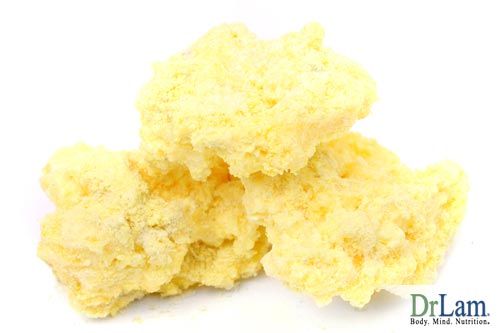
To understand sulfur and sulfide mineral sensitivity, first it is important to understand what sulfates, sulfites, and sulfide minerals are, how you might be exposed to them, and the difference between various sulfur compounds.
 Sulfur, descriptively called brimstone, is a nonmetallic chemical element that is naturally abundant. It has the atomic number 16 on the periodic table. At room temperature, sulfur is a yellow crystalline solid, though it is found in nature more commonly in sulfide and sulfate mineral form.
Sulfur, descriptively called brimstone, is a nonmetallic chemical element that is naturally abundant. It has the atomic number 16 on the periodic table. At room temperature, sulfur is a yellow crystalline solid, though it is found in nature more commonly in sulfide and sulfate mineral form.
Sulfur is essential to living cells. In the human body, it is one of the most abundant elements and has several important functions.
First of all, it’s part of the antioxidant glutathione, which helps the body detoxify. It’s also part of two amino acids: methionine, which you need to obtain from external sources, and cysteine, which your body produces.
Sulfur is also found in insulin. It plays a role in metabolism, and its deficiency in the body can lead to a variety of musculoskeletal problems as well as inflammation.
Sulfur is part of all sulfa drugs. It also comes in the chemical preservatives called sulfites, which are primarily found in foods and beverages, especially wine. Its biggest industrial use, however, is in the form of sulfuric acid used for certain chemical processes and the making of fertilizer.
Sulfa drugs, including sulfathiazole, sulfadiazine, sulfanilamide, as well as many others, are carbon-containing sulfur compounds called sulfonamides. Their action is to inhibit bacterial growth.
Sulfides, on the other hand, do not contain carbon. They are inorganic sulfur compounds. Some examples of sulfides and sulfide minerals include:
Sulfates are the salts of sulfuric acid, which are found naturally, and also commonly used in certain preparations such as:
Thiol is an organic compound similar to alcohol and phenol, but in place of the oxygen atom, it has a sulfur atom instead. Thiol compounds have a very distinct smell, such as the odor that comes from chopped onions. Thiols are added to odorless natural gas and petroleum gas to give them a detectable smell in case of leaks.
Thiols have the suffix –thiol added to their names to identify them, as alcohols have the suffix –ol added. Examples of thiols are ethanethiol and butanethiol. These same two in alcohol form are ethanol and butanol. Thiols can be converted to sulfides through the use of oxidants.
Although sulfur is an element that exists in the human body and is essential for health, some people are sensitive to it. If you are sensitive to sulfur, you may also be sensitive to thiols, sulfide minerals, and sulfites.
 For example, you could have a sulfonamide allergy, which is an allergy to sulfa medication. Such allergic reactions can be mild or life-threatening, so it’s important to know whether you have these kinds of sensitivities and what to avoid if you do.
For example, you could have a sulfonamide allergy, which is an allergy to sulfa medication. Such allergic reactions can be mild or life-threatening, so it’s important to know whether you have these kinds of sensitivities and what to avoid if you do.
Sulfites, like bisulfite and sulfur dioxide, can be an irritant to the airways of those with sulfite sensitivity. They can produce asthma-like effects like coughing, difficulty breathing, wheezing and tightness in the chest area. In other cases, an immune reaction can occur, where histamine is released into the system producing rashes, itchy and watery eyes, hives, swelling, and a runny nose.
Those with sulfite allergies are more prone to sulfide minerals sensitivity in general, including to sulfates. Symptoms of sulfate allergy are similar to that of sulfites, with itchy and watery eyes, itchy rashes on the skin, breathing difficulties, and even nausea and vomiting.
With regards to sulfide sensitivity, it depends on the compound. For example, hydrogen sulfide is a known toxic gas that should be handled with care, or better yet, avoided whenever possible. But thankfully, the amount of hydrogen sulfide that most people are exposed to is not enough to be harmful. Those that are most at risk work with hydrogen sulfide or live near industrial areas that use it.
Inhalation of hydrogen sulfide can cause irritation to the eyes, skin, and nose, and is especially risky for asthmatics, as it can cause breathing difficulties. Those who inhale a lot of it can go into respiratory arrest. It can also cause headaches, brain fog and even loss of consciousness.
You are more likely to encounter selenium sulfide as it is used for dandruff, seborrheic dermatitis, and tinea versicolor (a condition that causes skin discoloration).
If you did develop an allergy to selenium sulfide, you may experience skin irritation, oily or dry hair, hair loss, and dry skin. This would cease once you stopped using the product containing it for a while. But if you have a serious allergy, which is quite rare, you could experience more dangerous symptoms such as swelling of the face and tongue, rashes, and difficulty breathing.
As with any allergic reaction, call emergency services immediately if you experience these symptoms. It is also very important to always check all the products you use and foods you eat for any ingredients you are allergic to.
Unfortunately, there are no reliable skin or blood tests for sulfide minerals allergies and sensitivities. Most people realize they are sensitive to a sulfur-containing compound after they experience symptoms. Only in rare cases do skin allergy tests for sulfide minerals come up as positive. A supervised test where you try different sulfur-containing foods and await a reaction is another option.
 Adrenal fatigue is a state of dysregulation of the adrenal glands and their cortisol production. Cortisol is the body’s main anti-stress hormone, and it has important functions such as reducing inflammation, suppressing the immune system, maintaining the heart and blood vessels, and regulating blood pressure.
Adrenal fatigue is a state of dysregulation of the adrenal glands and their cortisol production. Cortisol is the body’s main anti-stress hormone, and it has important functions such as reducing inflammation, suppressing the immune system, maintaining the heart and blood vessels, and regulating blood pressure.
When there is chronic stress, whether physical or mental/emotional, the adrenal glands first begin to increase their output of cortisol to meet this growing demand. But after a while, if the stress continues, the adrenals begin to weaken, and their cortisol output drops. This entire process can culminate in a condition known as Adrenal Fatigue Syndrome (AFS).
Symptoms of AFS include tiredness, brain fog, lowered immunity, sleep disturbances, difficulty losing weight, fertility issues, PMS, anxiety, heart palpitations, sensitivities to certain foods and medications, and mild depression, to name a few.
The adrenal glands are part of a system of six circuits that forms the NeuroEndoMetabolic (NEM) Stress Response. These circuits are the inflammation, detoxification, cardionomic, neuro affect, hormone, and metabolic responses. They all work together to deal with stress.
If you are suffering from AFS or any type of NEM dysregulation, your food and medication sensitivities may worsen, or you may even develop new sensitivities.
This is because stress affects the permeability of the gastrointestinal wall, which can create a leaky gut. This allows particles into the bloodstream that are not supposed to be there, such as those from foods or medications, triggering the inflammation response of the NEM. The longer the inflammation persists and the more intense it is, the more sensitive you become to foods and medications. This includes, sometimes especially, those containing sulfur, sulfites, and sulfide minerals.
Certain genetic mutations can also have an effect on sulfur sensitivity.
The Methylenetetrahydrofolate reductase (MTHFR) enzyme catalyzes an important part of the main detoxification cycles in the body: the methylation cycle. The MTHFR enzyme changes certain molecules into another form. For example, it changes homocysteine into methionine. If this process doesn’t run smoothly, it can cause elevated homocysteine levels, which can increase the risk of heart disease, stroke, and cancer.
Genetic mutations can create problems for MTHFR function. Signs of such trouble include depression, migraines, irritable bowel syndrome, a family history of heart disease, deep vein thrombosis, peripheral neuropathy, chronic fatigue, fibromyalgia, stillbirths, and miscarriages.
Two types of mutations other than MTHR can also aggravate the methylation process.
The first is where the catechol-O-methyltransferase (COMT) enzyme, which helps degrade stimulatory compounds such as dopamine and adrenaline, does not work properly and lets these compounds accumulate in the nervous system. This can cause anxiety, insomnia, migraines, and irritability.
The second affects the cystathionine-beta-synthase (CBS) enzyme responsible for removing excess sulfur-containing amino acids from the system and converting homocysteine into cystathionine. When functioning normally, cystathionine reactions produce glutathione and ammonia. Also, sulfites and sulfates are created in this process through the conversion of hydrogen sulfides. A CBS mutation can make you sensitive to foods and beverages that contain sulfur.
 An abnormality can either increase or decrease CBS activity. Decreased CBS activity will result in elevated levels of homocysteine in the body. Coupled with MTHFR, the risk of very high levels of homocysteine are even higher. But interestingly enough, an increase in CBS activity will lead to lower levels of homocysteine, but to higher levels of ammonia. This is because the enzyme is working too fast in its conversion.
An abnormality can either increase or decrease CBS activity. Decreased CBS activity will result in elevated levels of homocysteine in the body. Coupled with MTHFR, the risk of very high levels of homocysteine are even higher. But interestingly enough, an increase in CBS activity will lead to lower levels of homocysteine, but to higher levels of ammonia. This is because the enzyme is working too fast in its conversion.
An increase in ammonia and urinary sulfates in the system can be damaging to the liver and kidneys, and can eventually lead to a loss in brain function if left unresolved. This increase in CBS activity can also lead to a decrease in glutathione synthesis and a loss in the methyl groups, which are crucial for the methylation process discussed earlier.
If you feel you might have these mutations, you can get lab serum tests, genetic tests, toxic screening, and urinalysis tests to check.
Researchers do not know if there is a link between AFS and MTHFR mutation, although they have similar symptoms, such as fatigue and depression. However, those with both AFS and the MTHFR mutation will need to be extra careful when adding MTHFR protocols, as AFS can increase sensitivity to certain supplements.
For mild AFS, you can try methylated folate and B12. Just make sure not to overuse these supplements, as they can aggravate AFS. When AFS is more advanced, however, these supplements can actually cause an adrenal crash.
An alternative is to start with liposomal glutathione. Those with the MTHFR mutation usually have low levels of glutathione, which is an important antioxidant. Liposomal glutathione supplements can help both MTHFR and support liver detoxification.
However, some people are also sensitive to glutathione. Glutathione contains sulfur, so if you are sensitive to sulfur, you should not be taking a glutathione supplement. As with any changes in medications and supplementation, you should be supervised by a medical professional.
There is a growing body of research showing that sulfur, sulfa, and sulfide mineral sensitivity may be hereditary. Genetic mutations and metabolic factors like the depletion of glutathione in the system, which increases drug sensitivities, may have some hereditary predispositions as well.
However, this doesn’t mean that there’s nothing you can do about your health. There are many options. First of all, if you suspect you are sensitive to sulfide minerals, sulfa drugs, and sulfur in general, you can try a sulfur elimination protocol to find out.
Begin by eliminating from your diet all foods, supplements, and medications that contain sulfur for a period of time. Ten days is a good test period. Foods to eliminate include:
Sulfur-containing supplements to avoid include:
 This is not a full list, however, so it is a good idea to look up high-sulfur foods and supplements to get a more complete picture.
This is not a full list, however, so it is a good idea to look up high-sulfur foods and supplements to get a more complete picture.
During this time, you can increase your intake of low-sulfur foods such as beef, chicken, shellfish, and all types of meats, as well as seeds such as sunflower seeds and flax seeds.
However, if you have AFS, be mindful of your dietary changes. It is best to get nutritional coaching so you do not worsen your condition.
Once the elimination period is over, you begin reintroducing high-sulfur foods back into your diet one at a time. Wait a few days before reintroducing the next food, and observe how your body reacts. This will help determine what you are most sensitive to, and what you can tolerate better.
By avoiding foods that cause your body to react negatively, you will likely experience more stability in health and energy levels, less inflammation, and better detoxification.
Again, it’s best not to make any changes without proper medical guidance if you have conditions like AFS, sulfide minerals sensitivity, or the MTHFR mutation. The complex relationship between each condition and nutrition requires a mindful and delicate approach, as well as constant monitoring when changes are applied.
The good news is that, with some adjustments, not only will your overall well-being improve, but some sensitivities you have may lessen or even disappear.